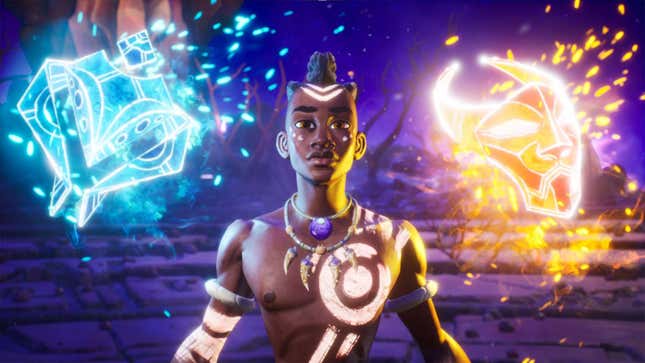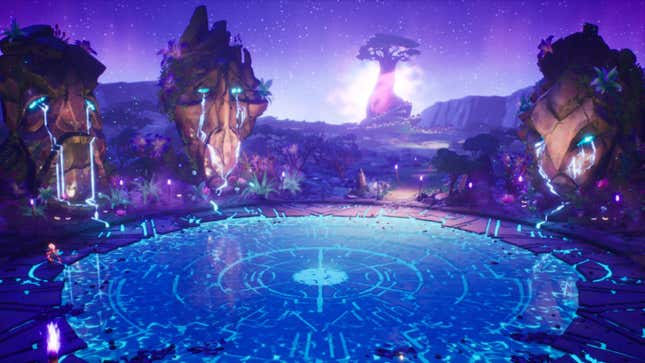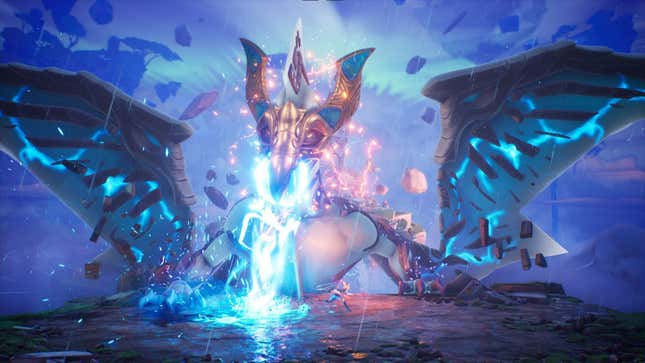
In the summer of 2020, as America tried to reckon with its institutionalized racism, the Black Lives Matter movement prompted video game studios to issue pro-BLM statements, donate to Black-centered charities, and promise to elevate Black voices. Several years later, it’s not all that clear if some (or any) studios followed through on those promises, or if any tangible change has taken place.
Abubakar Salim (Raised By Wolves) is an actor embedded in the video games industry—he voiced Bayek in Assassin’s Creed Origins, and he’s spent his life playing games. He pitched his idea for a game, a Metroidvania called Tales of Kenzera: Zau, to several of those same studios who made public statements in support of the BLM movement. “Not a single one got back to me,” he tells me over a video call.
But that didn’t deter him. Tales of Kenzera: Zau, developed by Surgent Studios (the company Salim founded) alongside EA Originals, which published Josef Fares’ award-winning 2021 game It Takes Two, debuts in April. The game received a high-profile reveal at The Game Awards courtesy of Salim himself, and a recent demo proved incredibly successful. I spoke with Salim over video call about his inspiration and determination, and how Tales of Kenzera will probably make us all cry.

A chance to tell his story
Salim is a first-generation Brit of Kenyan descent. Tales of Kenzera: Zau is inspired by the grief he experienced after his father’s passing and the stories his father told him about Bantu mythology. (Bantu is an ethnolinguistic group of approximately 400 native African ethnicities.) The visual motifs are undeniably Afrofuturistic, pulling from Bantu myths and modern media like the Black Panther comics and films. The lead character, Zau (voiced by Salim), is a shaman trying to resurrect his father who bargains with the God of Death. In an industry where these kinds of visual motifs and story beats are so rare, Tales of Kenzera stands out. But Salim is confident that the game’s heart and soul will resonate with everyone. After all, grief is universal. It spans languages and lands.
“[My pitch] wasn’t layered or colored in the idea of just trying to be just a ‘Black story.’ It is, at its heart, a human story, which I think was key. But at the same time, I’m telling the story from my perspective, and I happen to be Black and African,” Salim says, laughing a little. When pitching Tales of Kenzera, he knew that there would be boxes that studios would expect him to tick in order for the game to be considered “commercially viable.” But he wasn’t deterred by the industry’s historically narrow purview.
“I kind of was like, screw that. I just want to run something by them that really is important to me, that really speaks to me. ‘Cause I think, at the end of the day, it’s the passion and the drive that’s essentially gonna be winning hearts,” he says. That drive, and Salim’s vulnerability (which I experienced first-hand at his Game Awards presentation and again during our video call) won over the EA Originals team—they even helped him hone his pitch so that it could get a greenlight from the top brass.
Salim acknowledges that his development experience with EA Originals is an outlier in the industry—especially after he pitched tons of other studios before landing on EA’s indie branch.
I was pitching at the time when all these studios were all like, “Hey, we wanna give Black devs a chance.” Not a single one got back to me…I remember thinking to myself, “Huh, okay, you are looking for that perfect lightning in a bottle game, which is impossible to capture.” And those barriers are still there, even though you are advertising this as “we are gonna give Black people a chance.”
But EA Originals gave him one. “I think that’s why people are constantly fighting and striving to get an EA Originals title…it’s very hard to find a publisher who trusts you and kind of just allows you the space to essentially grow,” Salim suggests.

The pressures of telling that story
Though Salim wasn’t all that concerned with ticking boxes when working on Tales of Kenzera, he acknowledges the tacit pressure of creating a game that is undeniably Black and African.
“It’s so tricky. I remember having this feeling during the first phase of development, thinking ‘Yo, we have to hit this.’ Because if we don’t hit this right, it’ll never happen again. I remember thinking, if it wasn’t for Black Panther, these stories wouldn’t be told. Because of its success, people are like, ‘oh, there’s a commercial viability here.’ So now, as a game, we have to hit this, it has to be aces. And that sucks. I just want to tell my story!”
We discuss how opening up game development to elevate more marginalized voices and to tell more diverse stories can sometimes (wrongfully) be met with backlash, with some people claiming studios are bending to the will of “identity politics” or the “woke mob.”
“I’ve seen all of the reaction videos and people’s comments, both good and bad [about Tales of Kenzera].” He starts laughing. “I remember there was this one video I watched of this guy who was like, ‘I was listening to him and I was in on the story, I really agreed, but then he just decided to go woke and make it about Afrofuturism.’ I’m like, how is that woke?” He laughs again. “Honestly, I laughed because at the end of the day, I’m aware that his anger, it’s not directed at me. It’s something else…ultimately there is so much passion towards something that doesn’t necessarily need that energy.”
Even acknowledging that bad faith actors will complain about Tales of Kenzera for all the wrong reasons doesn’t alleviate all the pressure on Salim. For him, even if Tales of Kenzera is considered “just okay” by critics and players alike, that won’t be enough. “Then, the next time someone who’s already felt inspired by the fact that we tried this and they want to better the version of what we have created, they’ll be put down because of the fact that it’s African or you know, set somewhere else,” he says. “And it’s like, man, that’s pressure.”
But Salim brings it back to the heart and soul of Tales of Kenzera: processing grief. His experience with grief threads through the entire game, raw and honest in a manner that resonates with me, having lost my grandfather last year, and will resonate with countless others who have experienced loss. “I have to keep in mind that I just have to focus on telling a truthful story. That’s all I have to do. That’s all I can do. ‘Cause taking that responsibility [for Black storytelling in games]—it’s not my responsibility to take,” he says, reminding himself as much as he’s telling me.
Tales of Kenzera: Zau releases for Xbox Series X/S, PlayStation 5, Nintendo Switch, and PC on April 23.
.